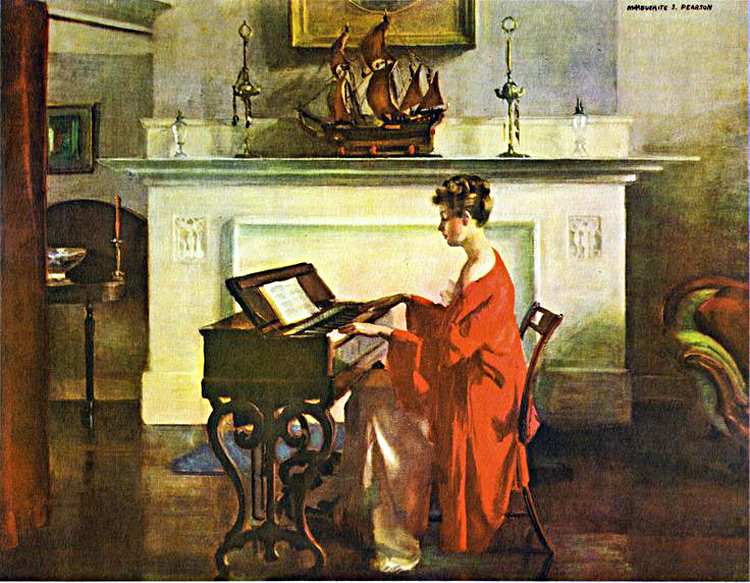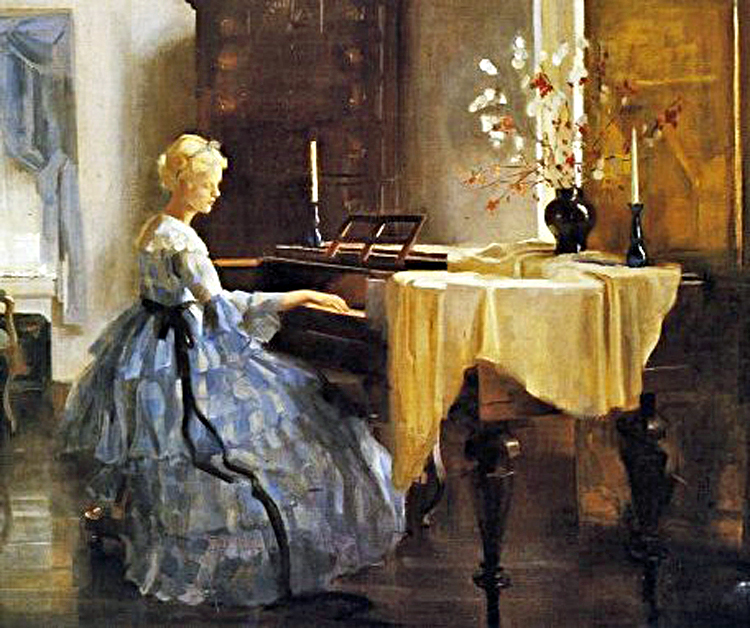 Did you ever hear that question? You must have. I’m sure you did. Or if you didn’t hear this exact one, you must have encountered a variation of it: Why are there no famous women writers in history? Why are there no famous women painters? And so on, you get the idea.
Did you ever hear that question? You must have. I’m sure you did. Or if you didn’t hear this exact one, you must have encountered a variation of it: Why are there no famous women writers in history? Why are there no famous women painters? And so on, you get the idea.
Today’s post is brought to you by the harsh and sad, very sad, realities of our human history. Women’s history, in particular. Yes, I mean that history that has been barely recorded. The one we know close to nothing about because it was deemed insignificant.
A few Sundays ago, at our meeting house (a term that I much prefer to “church”) the music director, who is an amazingly gifted pianist, played a piece by Fanny Mendelssohn. Never heard of her? Understandable. Neither had I. But that day I found out that apparently she had been Felix Mendelssohn-Bartholdy’s sister. Yes, I know. That rings a bell! And she had been as brilliant a musician as her brother. Only she couldn’t publish her compositions during her life, because she was too much of a woman for that, according to her brother. Her first duty was her house, and her father and brother, the famous composer, did not approve of her music interfering with that.
These are her father’s encouraging words:
“Music will perhaps be his profession, whilst for you it can and must only be an ornament, never the root of our being and doing. [. . .] remain true to these sentiments and this line of conduct; they are feminine, and only what is truly feminine is an ornament to your sex.”
“You must become more steady and collected, and prepare earnestly and eagerly for your real calling, the only calling of a young woman–I mean that of a housewife. Women have a difficult task; the unremitting attention to every detail, the appreciation of every moment for some benefit or other–all these and more are the weighty duties of a woman.”
To be completely truthful here, Fanny herself did not question her role. Before getting married, she writes the following very sad remarks:
“art is not for women, only for girls; on the threshold of my new life, I take leave of this plaything.”
Her brother did publish a few of Fanny’s compositions under his name and, to his credit, admitted to everyone that they had actually been written by his sister, even if that caused him embarrassment when people liked those pieces more than his own works.
You can read more about Fanny Mendelssohn here.
 I had almost forgotten the story of Fanny Mendelssohn, when, this morning, I read about the new research revealing that some of Bach’s most well-known compositions might actually belong to his wife Anna Magdalena. This does not make us doubt Bach’s genius, but it does bring to the forefront the existence of this woman that until today nobody knew about. She is one of, for sure, many, many more.
I had almost forgotten the story of Fanny Mendelssohn, when, this morning, I read about the new research revealing that some of Bach’s most well-known compositions might actually belong to his wife Anna Magdalena. This does not make us doubt Bach’s genius, but it does bring to the forefront the existence of this woman that until today nobody knew about. She is one of, for sure, many, many more.
So, here, this is why you’ve never heard of women doing anything of notice throughout history. From now on, spare me that question. Thank you.



The story about Fanny Mendelssohn is really interesting. I’m going to have to seek out recordings of her compositions.
But while it’s true that women have been discouraged (putting it mildly) from publishing and even composing their own creative works for centuries, according to this article by Alex Ross in The New Yorker, The Search for Mrs. Bach, Jarvis’s conclusions about Anna Magdalena Bach might not be as compelling as the Washington Post article suggests.
Even if the evidence is not very strong, and even if this case is disproved, I’m sure that sooner or later we’ll find about others, because this just was the reality of those historical times: women could not participate in the public arena regardless of their talents and knowledge, so a small number of them did find ways to hide behind the names of the men in their family or made up male personas, which allowed them to make use of their brilliance. Of course, this is out of the very few who had access to education and out of those only the women who were really ambitious would look for ways to beat the system. About all the others we’ll never know anything.